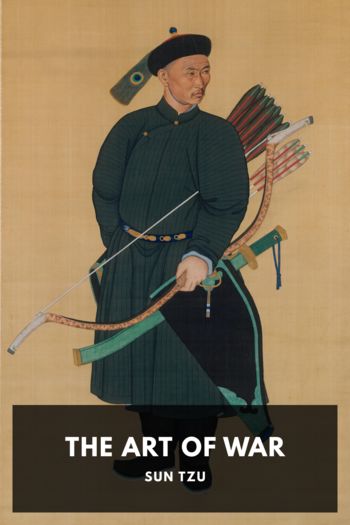The Art of War, Sun Tzu [best english books to read for beginners TXT] 📗

- Author: Sun Tzu
Book online «The Art of War, Sun Tzu [best english books to read for beginners TXT] 📗». Author Sun Tzu
This is probably the meaning, though Mei Yao-chʽên has the note: 以我之佚待彼之勞 “while we are taking our ease, wait for the enemy to tire himself out.” The Yü Lan has 引而勞之 “Lure him on and tire him out.” This would seem also to have been Tsʽao Kung’s text, judging by his comment 以利勞之. ↩
Less plausible is the interpretation favoured by most of the commentators: “If sovereign and subject are in accord, put division between them.” ↩
This seems to be the way in which Tsʽao Kung understood the passage, and is perhaps the best sense to be got out of the text as it stands. Most of the commentators give the following explanation: “It is impossible to lay down rules for warfare before you come into touch with the enemy.” This would be very plausible if it did not ignore 此, which unmistakably refers to the maxims which Sun Tzǔ has been laying down. It is possible, of course, that 此 may be a later interpolation, in which case the sentence would practically mean: “Success in warfare cannot be taught.” As an alternative, however, I would venture to suggest that a second 不 may have fallen out after 可, so that we get: “These maxims for succeeding in war are the first that ought to be imparted.” ↩
Chang Yü tells us that in ancient times it was customary for a temple to be set apart for the use of a general who was about to take the field, in order that he might there elaborate his plan of campaign. Capt. Calthrop misunderstands it as “the shrine of the ancestors,” and gives a loose and inaccurate rendering of the whole passage. ↩
Tsʽao Kung has the note: 欲戰必先算其費務 “He who wishes to fight must first count the cost,” which prepares us for the discovery that the subject of the chapter is not what we might expect from the title, but is primarily a consideration of ways and means. ↩
The 馳車 were lightly built and, according to Chang Yü, used for the attack; the 革車 were heavier, and designed for purposes of defence. Li Chʽüan, it is true, says that the latter were light, but this seems hardly probable. Capt. Calthrop translates “chariots” and “supply wagons” respectively, but is not supported by any commentator. It is interesting to note the analogies between early Chinese warfare and that of the Homeric Greeks. In each case, the war-chariot was the important factor, forming as it did the nucleus round which was grouped a certain number of foot-soldiers. With regard to the numbers given here, we are informed that each swift chariot was accompanied by 75 footmen, and each heavy chariot by 25 footmen, so that the whole army would be divided up into a thousand battalions, each consisting of two chariots and a hundred men. ↩
2.78 modern li go to a mile. The length may have varied slightly since Sun Tzǔ’s time. ↩
則, which follows 糧 in the textus receptus, is important as indicating the apodosis. In the text adopted by Capt. Calthrop it is omitted, so that he is led to give this meaningless translation of the opening sentence: “Now the requirements of War are such that we need 1,000 chariots,” etc. The second 費, which is redundant, is omitted in the Yü Lan. 千金, like 千里 above, is meant to suggest a large but indefinite number. As the Chinese have never possessed gold coins, it is incorrect to translate it “1000 pieces of gold.” ↩
Capt. Calthrop adds: “You have the instruments of victory,” which he seems to get from the first five characters of the next sentence. ↩
The Yü Lan omits 勝; but though 勝久 is certainly a bold phrase, it is more likely to be right than not. Both in this place and in § 4, the Tʽung Tien and Yü Lan read 頓 (in the sense of “to injure”) instead of 鈍. ↩
As synonyms to 屈 are given 盡, 殫, 窮, and 困. ↩
久暴師 means literally, “If there is long exposure of the army.” Of 暴 in this sense Kʽang Hsi cites an instance from the biography of 竇融 Tou Jung in the Hou Han Shu, where the commentary defines it by 露. Cf. also the following from the 戰國策: 將軍久暴露於外 “General, you have long been exposed to all weathers.” ↩
Following Tu Yu, I understand 善 in the sense of “to make good,” i.e. to mend. But Tu Mu and Ho Shih explain it as “to make good plans”—for the future. ↩
This concise and difficult sentence is not well explained by any of the commentators. Tsʽao Kung, Li Chʽüan, Mêng Shih,





Comments (0)